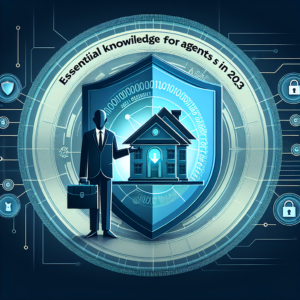Cybersecurity in Real Estate: Essential Knowledge for Agents in 2024
In the digital era, real estate professionals are increasingly reliant on technology for everything from client communication to transaction management. This dependence, however, brings with it the heightened risk of cyber threats.
As a real estate agent, understanding and mitigating these risks is not just beneficial; it’s imperative for safeguarding your business and your clients’ interests.
The Rising Tide of Cyber Threats in Real Estate
The real estate sector, with its wealth of sensitive client information and large financial transactions, has become a lucrative target for cybercriminals.
Phishing attacks, where fraudulent emails or messages lure individuals into providing confidential information, are particularly prevalent.
Other common threats include ransomware, where attackers encrypt an organization’s data and demand payment for its release, and business email compromise (BEC) scams, which often involve spoofed emails directing the transfer of funds to fraudulent accounts.
 Understanding the Dangers of Phishing Scams
Understanding the Dangers of Phishing Scams
A significant threat facing real estate professionals is phishing scams. These scams involve cybercriminals masquerading as legitimate entities to trick individuals into divulging sensitive information like login credentials or personal data.
Real estate agents, often handling confidential client information and large transactions, are prime targets.
Phishing attempts can come in various forms, including deceptive emails, fraudulent websites, or even fake customer inquiries. Recognizing these scams involves vigilance and an understanding of common tactics used by cybercriminals.
Pro Tip: Discover the most effective strategies for generating leads in real estate. Check out our insights at The Best Way to Generate Leads in Real Estate.
The Prevalence of Wire Fraud in Real Estate Transactions
Particularly alarming in the real estate sector is wire fraud, especially during the closing phase of property transactions. This type of fraud involves tricking either the buyer or the real estate professional into wiring funds to a fraudulent account.
Cybercriminals often intercept legitimate email conversations or create convincing fake emails that appear to come from a trusted source, such as a real estate agent or a title company.
They then provide fraudulent wire transfer instructions, diverting funds to their accounts. To combat this, it’s crucial for agents to verify all communication regarding financial transactions through multiple, independent channels.
Pro Tip: Buyers should always call the closing attorney, title company or escrow agent whom they’re wiring funds to verbally confirm any emailed wire transfer details.
 Risks of Hackers Posing as Real Estate Agents
Risks of Hackers Posing as Real Estate Agents
Another growing concern is the risk of hackers impersonating real estate agents. By gaining access to an agent’s email account, hackers can send authentic-looking messages to clients, directing them to fraudulent websites or convincing them to divulge sensitive information.
This not only leads to financial loss but can also severely damage the reputation of the real estate professional. Implementing strong security measures, such as multi-factor authentication and regular password changes, is vital in preventing unauthorized access to agent accounts.
Implementing Robust Cybersecurity Measures
To combat these threats, real estate agents must adopt a proactive cybersecurity stance. Key measures include:
Secure Communication Channels: Utilize encrypted email and secure messaging platforms for all client communications. Cribfox.com’s real estate agent productivity software, for example, offers secure communication options to connect agents with clients.
Regular Software Updates: Ensure all software, especially those related to transaction management and customer relationship management (CRM), are regularly updated to patch vulnerabilities. With Cribfox’s cloud based end-to-end software (i.e. forms, e-signatures, CRM & showing management), you never have to worry about having the latest version.
Employee Education and Awareness: Train staff on identifying phishing attempts and safe internet practices. Regularly updating this training is vital as cyber threats evolve.
Strong Password Policies: Encourage the use of complex passwords and implement multi-factor authentication (MFA) wherever possible.
Data Backup and Recovery Plans: Regularly back up critical data and have a disaster recovery plan in place to minimize damage in the event of a data breach. Cribfox automatically keeps a copy of all sent forms and e-signatures, so if your email goes down, you’ll have a backup in the cloud of all your important documents.
Pro Tip: Enhance your real estate business with the right tools. Explore the benefits of free CRM solutions for agents in our guide at Free CRM for Real Estate Agents.
Understanding Legal Responsibilities and Compliance
Real estate agents must also be aware of their legal obligations regarding data protection. This includes compliance with laws such as the General Data Protection Regulation (GDPR) in Europe or the California Consumer Privacy Act (CCPA) in the United States.
These regulations mandate certain standards for data handling and grant individuals rights over their personal data.



